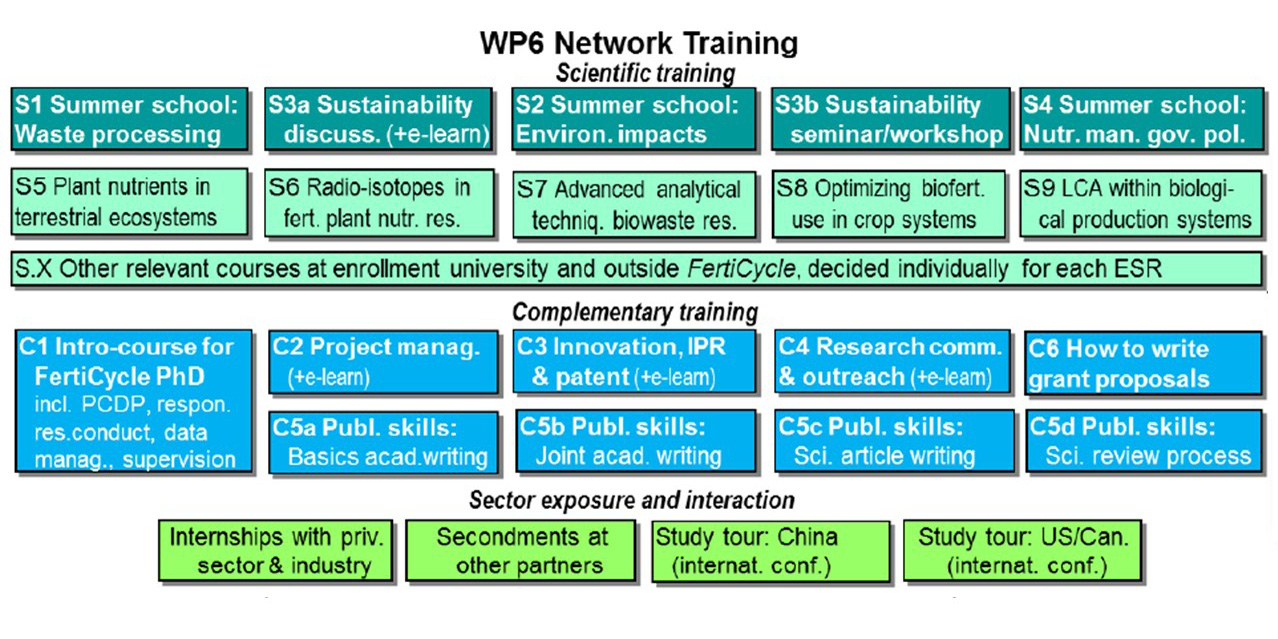FertiCycle Courses Update!

By Lars Stoumann Jensen
The FertiCycle training program takes a structured approach for each fellow, consisting of training through original hands-on research as well as training through courses, both individually and at the network level. The basic idea is to combine local on-site specialist training of the ESR’s (project supervision and secondments/internships) with complementary and scientific network training activities (scientific and generic courses for the ESR).
The training program was designed as a cohort approach; their training takes a joint learning approach. The ESRs are exposed to key research and industry ‘platforms’, as well as wider research environments within the beneficiary institutions and partner industry organisations. Below are a list of courses, with descriptions, that have been completed or are ongoing as of March 2022.
C1-Introduction course for PhD students on FertiCycle: Introduction to time & project management; Competence development planning; Researchable questions; Research ethics and evaluation; Data Management Plan (DMP); Oral and written presentation techniques. Open Science workshop: Open access, Open Data, Open Reproducible Research, Open Science Evaluation, Open Science Policies and Open Science Tools. ESR initiate preparation of a personal career development plan (PCDP) incl. personal goals as well as a research plan.
C2-Project Management: Project analysis; Milestone planning; Gantt charts; Resource & stakeholder analysis; Risk management techniques; Health & Safety, Team leadership. Students make project management plan based on their PCDP.
C3-IPR Course: This course inludes topics such as innovation, entrepreneurship, knowledge valorisation, intellectual property, IP case studies, IPR and business planning; format includes both lectures and participants homework with own cases.
S1-Waste processing and upcycling concepts: To give a thorough introduction to the management, treatment and up-cycling of bio-waste into valuable fertiliser products, and to gain understanding of fertiliser production and processes. Mass & energy balances, Separation of Mass & energy balances, Separation of P and dry matter from bio-waste through application of mechanical separation, Reactor technologies for biogas production from bio-waste materials, Combustion, gasification and pyrolysis techniques - chemistry, technology and emissions control, Technologies for the reduction of the emission of odor, ammonia and GHG from stored bio-waste, nutrient cycling through biochars, ashes, upgraded biowaste residuals, fertiliser factory visits.
S2-Nutrient cycling and environmental and agronomic impacts + S3*-Discussion forum on Sustainability of upcycled biobased fertiliser products: To give a thorough understanding of the agronomic, environmental and market impacts from the production and use of different BBF in a range of crops, soils and climates. Raise student awareness and knowledge of sustainability concepts (environmental, economic, social aspects) related to upcycled biobased fertiliser production and use. Finally, to introduce to the scientific conference format and provide tools to get the most out of participating. Research and industry results presented at the ManuResource 2021 (rescheduled to May 2022) conference will be used to inform of potential impacts on agricultural productivity, soil quality, nutrient cycling, loss to the environment and market potentials.
*The S2 & S3 courses are ongoing, and will conclude at the rescheduled ManuREsource conference in May 2022.
